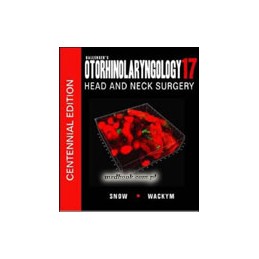- Obniżka


 Dostawa
Dostawa
Wybierz Paczkomat Inpost, Orlen Paczkę, DHL, DPD, Pocztę, email (dla ebooków). Kliknij po więcej
 Płatność
Płatność
Zapłać szybkim przelewem, kartą płatniczą lub za pobraniem. Kliknij po więcej szczegółów
 Zwroty
Zwroty
Jeżeli jesteś konsumentem możesz zwrócić towar w ciągu 14 dni*. Kliknij po więcej szczegółów
The editorial leadership for the 17th edition has been expanded to include P. Ashley Wackym as Editor, and it includes 101 chapters (increased from 67) with sections on otology and neurotology, rhinology, facial plastic and reconstructive surgery, pediatric otorhinolaryngology, laryngology and bronchoesophagology, head and neck surgery and increased emphasis on molecular medicine.
Color illustrations appear throughout this edition. The presentation of basic science underlying clinical otorhinolaryngology has been expanded and chapters on clinical topics are structured to provide comprehensive coverage for the clinicians. Disorders of smell and taste, balance and hearing, voice, speech and language are also emphasized provide comprehensive coverage of the discipline.
The 17th edition presents a comprehensive compendium of current knowledge in otorhinolaryngology head and neck surgery and provides full coverage needed by practitioners in the 21st century.
New chapters include Stereotactic radiosurgery, Biofilms, Outcomes and clinical research, Robotic surgery and Chemoradiation.
Senior authors were chosen not only for original contributions but also for their intellectual leadership of the specialty.
Basic science and clinical chapters stress the role of molecular biology in the pathogenesis of disease. Throughout, the genetic basis of disease has been emphasized.
The book is a unique blend of state-of-the-art clinical techniques, methods and outcomes together with coverage of basic mechanisms and science. It provides students, residents, fellows and practitioners with the understanding necessary to participate fully in the use of molecular biology in therapy.
Opis
1: Anatomy of the Auditory and Vestibular Systems
2: Development of the Ear
3: Molecular Biology of Hearing and Balance
4: Physiology of the Auditory and Vestibular Systems
5: Gene Therapy and Inner Ear Drug Delivery
6: Hair Cell Regeneration
7: Hair Cell Biophysics and Otoacoustic Emissions
8: Central Auditory Processing and Functional Imaging
9: Diagnostic Audiology, Hearing Aids and Habilitation Options
10: Evaluation of the Vestibular System
11: Imaging of the Temporal Bone
12: Pathologic Correlates in Otology and Neurotology
13: Outcomes Research, Clinical Trials and Clinical Research
14: Diseases of the External Ear
15: Eustachian Tube Dysfunction
16: Otitis Media and Middle-Ear Effusions
17: Chronic Otitis Media and Cholesteatoma
18: Cranial and Intracranial Complications of Acute and Chronic Otitis Media
19: Reconstruction of the Middle Ear
20: Otosclerosis
21: Trauma to the Middle Ear, Inner Ear and Temporal Bone
22: Noise-Induced Hearing Loss
23: Ototoxicity
24: Idiopathic Sudden Sensorineural Hearing Loss
25: Perilymphatic Fistulae
26: Hereditary Hearing Impairment
27: Autoimmune Inner Ear Disease and Otological
Manifestations of Systemic Disease
28: Menieres Disease,Vestibular Neuronitis, Paroxysmal Positional Vertigo, Superior Semicircular Canal Dehiscence and Vestibular Migraine
29: Presbyacusis and Presbyastasis
30: Vestibular and Balance Rehabilitation
31: Tinnitus and Decreased Sound Tolerance
32: Cochlear Implantation
33: Cochlear Implant Coding Strategies and Device Programming
34: Facial Paralysis
35: Vestibular Schwannomas and Other Skull-Base Neoplasms
36: Stereotactic Radiosurgery and Radiotherapy
Rhinology
37: Anatomy and Physiology of the Nose and Paranasal Sinuses
38: Olfaction and Gustation
39: Cellular Biology of the Immune System
40: Assessment of Nasal Function
41: Imaging of the Nasal Cavities, aranasal Sinuses, Nasopharynx Orbits Infratemporal, Fossa Pterygomaxillary Fissure and Base of Skull
42: Etiology of Infectious Diseases of the Upper Respiratory Tract
43: Allergic Rhinitis
44: Epistaxis
45: Acute and Chronic Nasal Disorders
46: Acute Rhinosinusitis and Its Complications
47: Chronic Rhinosinusitis and Polyposis
48: Headache and Facial Pain
49: Primary Paranasal Sinus Surgery
50: Revision Paranasal Sinus Surgery and Surgery of the Frontal Sinus
51: Endoscopic Surgery of the Skull Base, Orbits and Benign Sinonasal Neoplasms
Facial Plastic and Reconstructive Surgery
52: Reconstruction of the Outstanding Ear
53: Rhinoplasty and Septoplasty
54: Nasal Reconstruction
55: Facial Fractures
56: Wound Healing and Flap Physiology
57: Scar Revision and Skin Resurfacing
58: Local Flaps in Facial Reconstruction
59: Regional Flaps and Free Tissue Transfer
60: Rejuvenation of the Upper and Mid Face
61: Rejuvenation of the Lower Face and Neck
Pediatric Otorhinolaryngology
62: Microtia Canal Stenosis and Middle-Ear Anomalies
63: Anatomy and Physiology of the Oral Cavity and Pharynx
64: Diseases of the Oral Cavity, Oropharynx and Nasopharynx
65: Deep Neck Infections
66: Sleep Apnea in Children
67: Robotic Surgery and Surgical Simulators
68: Airway Management in the Infant and Child
69: Congenital Anomalies of the Larynx
70: Congenital Anomalies of the Head and Neck
71: Biofilms and their role in Ear and Respiratory Infections
Laryngology and Bronchoesophagology
72: Development, Anatomy and Physiology of the Larynx
73: Assessment of Vocal Function
74: Disorders of Speech and Language
75: Benign Laryngeal Lesions
76: Laryngopharyngeal Reflux Infections and Manifestations of Systemic Diseases
77: Trauma to the Larynx
78: Airway Control and Laryngotracheal Stenosis in Adults
79: Neurogenic Disorders of the Larynx
80: Laryngeal Paralysis
81: Functional Voice Disorders and the Aging Voice
82: Imaging of the Larynx, Trachea, Bronchi and Esophagus
83: Laryngoscopy
84: Bronchology
85: Esophagology
86: Sleep Medicine and Surgery
Head and Neck Surgery
87: Molecular Biology of Squamous Cell Carcinoma
88: Mechanisms of Immune Evasion of Head and Neck Cancer
89: Molecular Diagnostic Approaches to Head and Neck Cancer
90: Imaging of the Oral Cavity, Pharynx, Salivary Glands and Neck
91: Targeted Therapeutic Approaches to Head and Neck Cancer
92: Chemoradiation for Head and Neck Cancer
93: Immunotherapy for Head and Neck Cancer
94: Nutrition of the Patient with Head and Neck Cancer
95: Neoplasms of the Anterior Skull Base
96: Neoplasms of the Nasopharynx
97: Neoplasms of the Oral Cavity
98: Neoplasms of the Oropharynx and Hypopharynx
99: Neoplasms of the Larynx and Laryngopharynx
100: Diseases of the Salivary Glands
101: Diseases of the Thyroid and Parathyroid Glands
Indeks: 75372
Autor: Moshe Schein
For Surgeons, Residents, Lawyers & Even Those Who Never Have Any Complications
